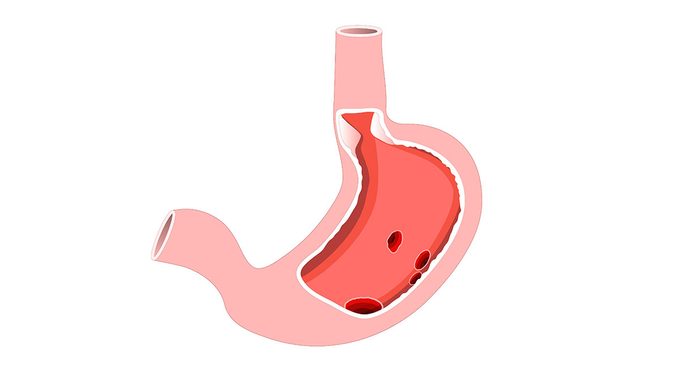What’s Causing Your Stomach Ulcer?
Stomach ulcers aren’t as common as they used to be, but many Canadians still experience these stomach sores that cause abdominal pain and more.

Frequent indigestion? All-too-often nausea? Burning stomach pain? You’ve got three of the classic symptoms of a stomach ulcer.
“A peptic ulcer is an open sore that extends from the stomach or duodenum (the upper part of the small intestine) into the muscle lining of the gut,” says Dr. Catherine Dubé, a gastroenterologist at The Ottawa Hospital and associate professor at the University of Ottawa. Stomach ulcers occur when the thick layer of mucous that protects the stomach from digestive juices is disrupted. Don’t miss how Hilary Duff is taking care of her digestive health.
The main causes of stomach ulcers
The most common cause is bacterial infection, known scientifically as Helicobacter pylori (H. pylori). It is considered one of the most common bacterial infections, affecting as many as 60 percent of people around the globe. “Many people who are infected never know it, because it doesn’t pose them any problems,” says Dr. Dubé. But for others it leads to chronic inflammation of the stomach lining and eventually ulcers, typically in later life. The bacteria are believed to spread from saliva and feces (which can happen when there’s insufficient hand washing). It may also spread with contaminated food and water. “Sixty or even 100 years ago Helicobacter infections and the rates of peptic ulcers were much higher, but thanks to improved sanitary conditions in North America the prevalence here is way down,” she says. “It’s rare to see a young person with the infection, unless they’ve immigrated from a country with a high prevalence.”
The other main cause of stomach ulcers is a person’s history of taking nonsteroidal anti-inflammatory drugs (NSAIDs). These are commonly used pain relief meds that include ASA (Aspirin), ibuprofen (like Advil and Motrin) and naproxen sodium (like Aleve) among others. Regular use, particularly for treatment of an ongoing pain issue related to something like arthritis (check out these science-backed natural home remedies for arthritis pain relief), for example, can irritate the lining of the stomach over time, creating the right conditions for an ulcer to develop.
How stomach ulcers are diagnosed
If you think you’ve got an ulcer, your doctor may request an upper endoscopy (a thin tube is inserted through your mouth to the small intestine in search of bleeding and abnormal tissue) for a formal diagnosis, but often they’ll start with a blood test to screen for H. pylori. If you’re infected and displaying the classic symptoms, that might be enough evidence to start treatment — especially if you’re also taking an NSAID medication.
The treatment you’ll need
Ulcers are typically treated with medications designed to block acid production, called proton pump inhibitors (PPIs) along with a round of antibiotics, if H. pylori is detected. Fortunately, with the right medications, ulcers usually heal easily and symptoms ease up almost immediately. “Most ulcers will heal during that two-week course of antibiotics,” says Dr. Dubé.
A relatively easy diagnosis and treatment doesn’t mean you should discount the severity of an aching abdomen or other persistent symptoms, though. When ulcers go untreated, they can become a serious health issue. Learn more about how to best manage stomach ulcers.




